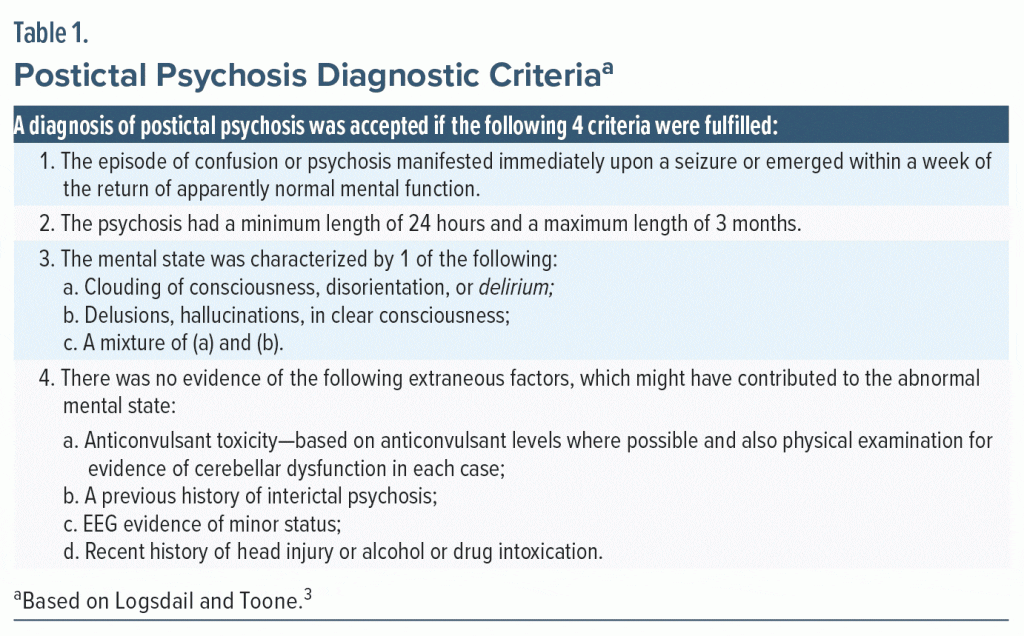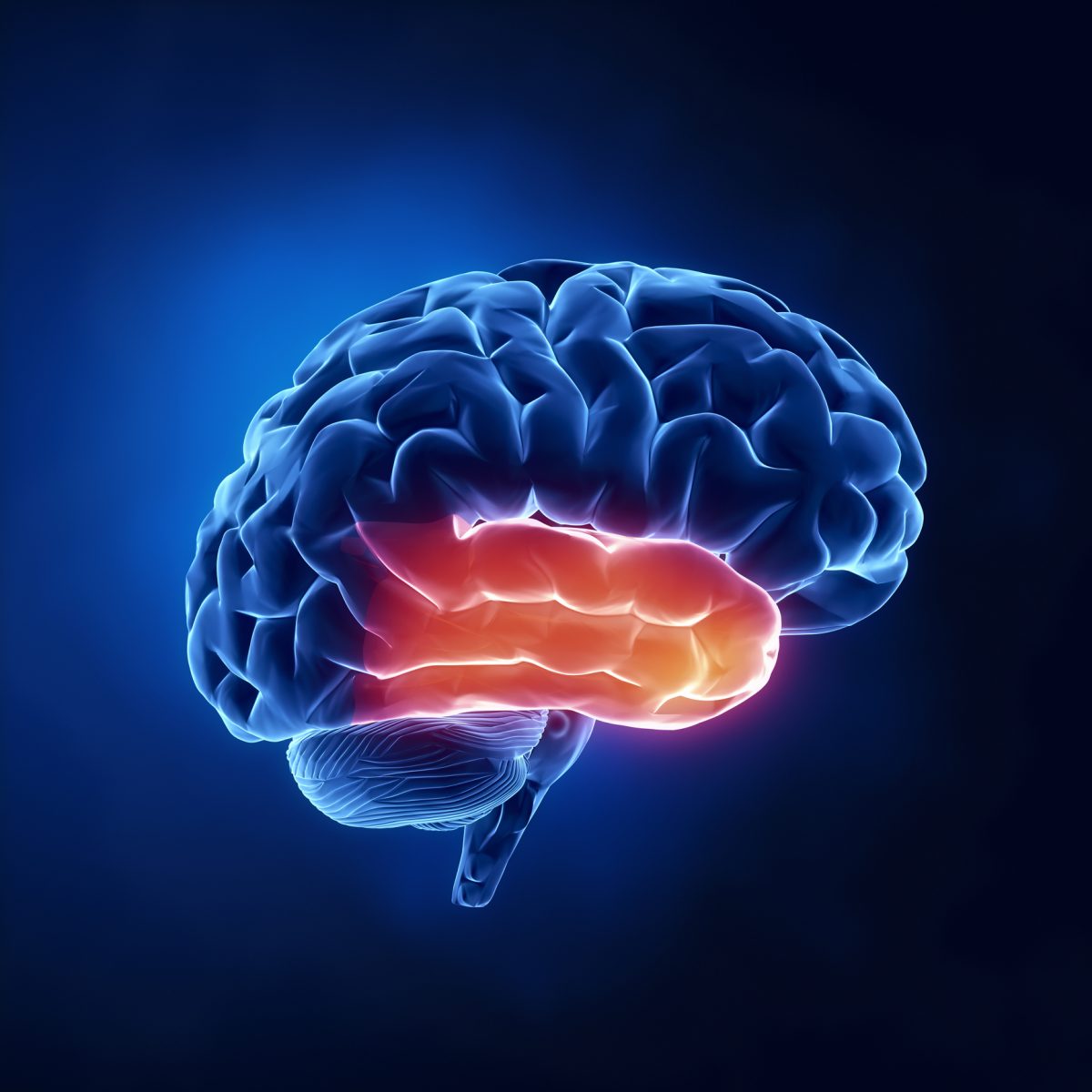Epilepsy has long been treated by the fields of both psychiatry and neurology. Currently, most epileptic patients are treated by neurologists; nevertheless, there is a clear overlap between both areas.1
The most common psychosis in patients with epilepsy is postictal psychosis (PIP). With no major psychopathologic differences from other forms of psychosis, PIP incidence and prevalence are not entirely known. We report a case of PIP to highlight the importance of the recognition of this condition.2
Case Report
A 74-year-old woman, diagnosed with epilepsy at the age of 12 years and no psychiatric history, was brought to the emergency department due to progressive abnormal behavior for 4 days and delusional ideas of having her identity stolen. Her mental state examination showed a distrustful and uncooperative attitude, with viscous and hostile contact; pressure to keep talking and prolixity; flight of ideas; persecutory delusional ideation; and irritable mood with no insight. No physical or neurologic abnormalities were found.
Twenty-four hours before the symptoms started, the patient had an absence episode witnessed by her daughter. Minutes later, she regained total consciousness with no memory of what happened. Therapeutic noncompliance was denied. For the past 4 years, the patient had been taking oxcarbazepine 300 mg twice/d, with the report of approximately 1 absence episode per year. After 2 of these episodes, the patient had presented a condition similar to what she was currently experiencing, but with fast clinical resolution without treatment. Traumatic brain injury or symptoms related to encephalitis were denied. Inpatient treatment was proposed, which the patient accepted. The initial electroencephalography evaluation showed no epileptic activity. A computed tomography scan showed no structural alteration nor did blood/urine evaluation at admission. A diagnosis of PIP was assumed.
Psychopharmacologic therapy with aripiprazole 20 mg/d and clonazepam 2 mg/d was started at admission. Carbamazepine was titrated to 900 mg/d. The patient gradually presented regularization of speech output, maintaining some level of prolixity. Normalization of the course of thought, as well as mood stabilization, was verified. She was discharged, clinically stabilized, on the 21st day of hospitalization.
Discussion
Logsdail and Toone3 defined PIP diagnostic criteria, as shown in Table 1. All the diagnostic criteria were present in our patient, so a PIP diagnosis was assumed. The mean time between diagnosis and PIP is 10–20 years; however, our patient had a 62-year history of epilepsy, which suggests the cumulative effect of recurrent seizures in the development of psychosis.4,5 Most cases of PIP are self-limited up to 3 months.2,3,6 Prior episodes of PIP are a risk factor for new episodes of PIP.7
As most studies indicate that seizure frequency is prior to the onset of PIP, effective antiepileptic treatment is essential to prevent PIP. After the onset of psychosis, resolution of symptoms can be achieved with low-dose atypical antipsychotics.3,5 It is important to note that as atypical antipsychotics decrease the seizure threshold, antiepileptic dosage must be carefully optimized.7
Some studies now advocate that those patients with chronic epilepsy and at high risk for PIP should be monitored, and treatment with low-dose antipsychotics should only be considered at the earliest signs of disease. If the patient has a history of recurrent PIP, antipsychotics may be considered during the 6 months after seizures and slowly tapered off.7,8
Conclusion
Postictal psychosis is a complication of chronic epilepsy that remains poorly understood and is the object of few scientific publications. A prior episode of PIP and psychosis history is a risk factor for new episodes. Clinicians should be aware of this diagnosis, as pharmacologic optimization is able to prevent PIP. In cases of recurrent PIP, as that presented here, psychoeducation and psychopharmacology are recommended.
Article Information
Published Online: August 15, 2023. https://doi.org/10.4088/PCC.22cr03439
© 2023 Physicians Postgraduate Press, Inc.
Prim Care Companion CNS Disord. 2023;25(4):22cr03439
Submitted: October 25, 2022; accepted January 26, 2023.
To Cite: Abrantes JS, Lobarinhas MJ, Lourenço JP. A case of postictal psychosis. Prim Care Companion CNS Disord. 2023;25(4):22cr03439.
Author Affiliations: Psychiatry and Mental Health Department, Centro Hospitalar Universitário Lisboa Norte, Lisbon, Portugal (Abrantes, Lourenço); Child and Adolescent Psychiatry, Centro Hospitalar Universitário Lisboa Norte, Lisbon, Portugal (Lobarinhas).
Corresponding Author: José Sobral Abrantes, MD, Centro Hospitalar Universitário Lisboa Norte, Av. Prof. Egas Moniz MB, Lisboa, 1649-028 Lisbon, Portugal ([email protected]).
Relevant Financial Relationships: None.
Funding/Support: None.
Patient Consent: Consent was received from the patient to publish the case report, and information has been de-identified to protect anonymity.
References (8)

- Kanemoto K. Involvement of psychiatrists in epilepsy treatment helps not only neurologists but also psychiatrists themselves. Acta Psychopathol. 2015;1(03):17. CrossRef
- Trimble M, Kanner A, Schmitz B. Postictal psychosis. Epilepsy Behav. 2010;19(2):159–161. PubMed CrossRef
- Logsdail SJ, Toone BK. Post-ictal psychoses: a clinical and phenomenological description. Br J Psychiatry. 1988;152(2):246–252. PubMed CrossRef
- Devinsky O. Postictal psychosis: common, dangerous, and treatable. Epilepsy Curr. 2008;8(2):31–34. PubMed CrossRef
- Liu HC, Chen CH, Yeh IJ, et al. Characteristics of postictal psychosis in a psychiatric center. Psychiatry Clin Neurosci. 2001;55(6):635–639. PubMed CrossRef
- Lancman ME, Craven WJ, Asconapé JJ, et al. Clinical management of recurrent postictal psychosis. J Epilepsy. 1994;7(1):47–51. CrossRef
- Morrow EM, Lafayette JM, Bromfield EB, et al. Postictal psychosis: presymptomatic risk factors and the need for further investigation of genetics and pharmacotherapy. Ann Gen Psychiatry. 2006;5(1):9. PubMed CrossRef
- Kanner AM. Psychosis of epilepsy: a neurologist’s perspective. Epilepsy Behav. 2000;1(4):219–227. PubMed CrossRef
Enjoy this premium PDF as part of your membership benefits!






